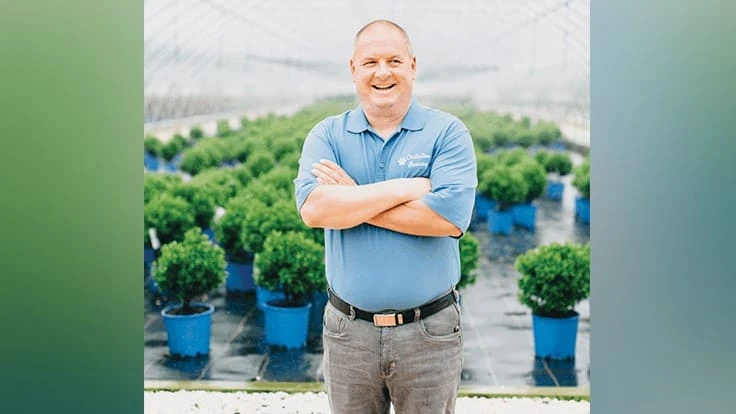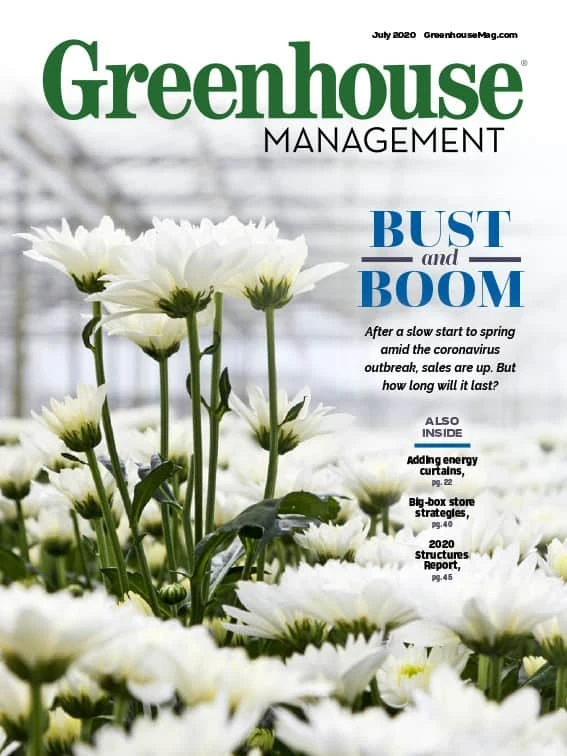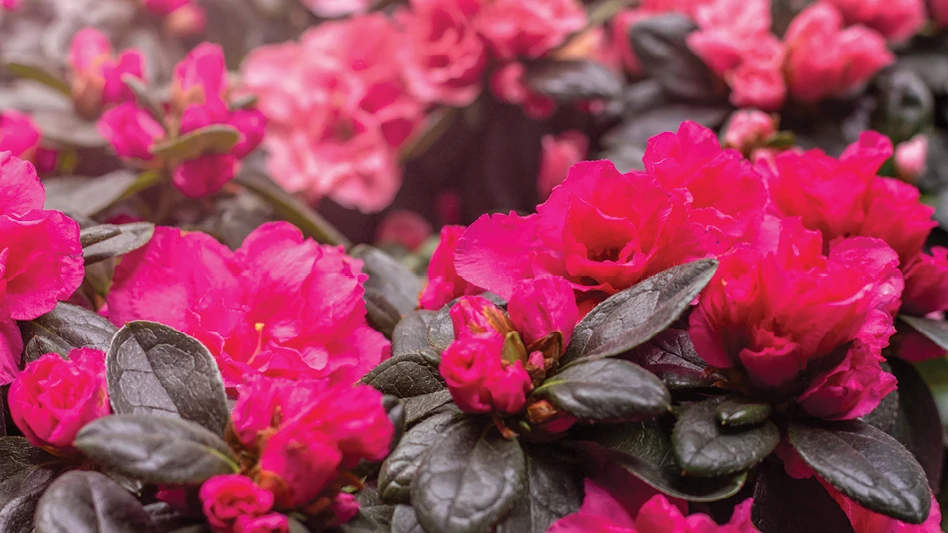

As the eldest of three siblings, Donald Blew has always had an innate knack for leadership and responsibility. That hasn’t changed much, given his presidential status at Centerton Nursery in Bridgeton, New Jersey. Like many operations, management has been in the family for multiple generations and in Donald’s case, he leads the third.
Generational growth
Nearly 50 years ago, Centerton only consisted of 9 acres of land that were purchased by Donald’s grandparents, Ray and Marlene. That property was home to fewer than a dozen small greenhouses that held a few azaleas and rhododendrons, along with a 10- by 10-foot hut, otherwise known as the office. In 1977, Donald’s father Denny joined the company after graduating college. Now in its fifth decade of business, the nursery is operated by Donald and his two younger siblings, Robert (Bob) and Amy.
Currently, Centerton sits on 3 million square feet under plastic and has around 190 greenhouses that were drawn and built by Donald himself. The nursery now grows broadleaf evergreens, flowering shrubs, perennials and a full line of edibles (vegetables and herbs) — more than the few azaleas and rhododendrons it once had — and sells 10 specially crafted brands, along with many others.
The Blew brothers also co-own BlewLine Nursery, a bareroot daylily and shrub hub that was founded by their grandfather in the early 1990s to mitigate the unreliability of finding bareroot perennials. In 2006, they purchased the property with Bob serving as president and Donald as vice president and expanded the offerings to more than 100 varieties of bareroot shrubs. In 2016, they became a seller of the Star Roses & Plant brand.
Organically driven
While working at two nurseries may sound like a heavy workload, it’s virtually all Donald knows.
“I grew up on one end of the nursery, so I had a really big playground,” Donald says. “I even keep a picture here on my desk of me at 3 years old, loading a truck with my dad. That was always what I wanted to do — come back and run the nursery.”
After high school, both Bob and Amy went to college to pursue other careers. Amy majored in communications at Loyola Marymount University and Bob majored in agriculture business at Penn State University. And while Donald studied agriculture business as well, he attended Delaware Valley University with specific plans of applying his knowledge to the nursery. This wasn’t by choice but was a requirement by Donald’s grandfather who determined it a prerequisite to running the business. His grandfather had to practically “force him” to go, but it was Daniel Seik, an independent salesman for Centerton and decades-long friend of the Blew family, who suggested the major.
“I recommended it to him because with working alongside his grandfather and dad, he was already familiar with plant identification. He probably even knew more about the plants than his professors,” Daniel says. “But school gave him the background of business.”
Daniel says he’s known Donald since he was about 12, and although his siblings grew up on the nursery as well, Donald had an intuitive attraction for the business. Some natural qualities he has, according to Daniel, are “common sense” and the ability to “solve problems and figure things out,” much like his grandfather. He also says Donald was “curious” and “always designing things."
“Even though he doesn’t have an engineering degree, he’s definitely an engineer,” says Amy Ordog, who is five years younger than Donald.
When he began their Stone Cottage Farm — a line dedicated to lavender — Donald built the facility and designed rolling benches just from looking at other places. He also designed their potting machines, water boom, water tunnel, trimming machines and greenhouses, and has replicated concepts he’s seen from his trips to Europe. Amy says every time they attend a trade show, they ask Donald to replicate something and he'll respond with, "Yep, I'll get it done!"

From employees to family
Amy also describes Donald as “humble” and “hands-on,” and uses his interaction with their employees as an example.
“He knows every single person who works here — all 120 of them — and that makes me proud because there are other companies who don’t know who’s working for them,” she says. “He knows everybody’s first and last name and is the one who actually hands out checks.”
He also implemented a generous employee production bonus where employees receive a bonus for their daily accomplishments, on top of their hourly wages. But the biggest bonus he gives is in the employees evaluation three times a year.
“It’s just another way to say, ‘Hey, we’re all working together,’” Donald says. “It’s about the company and if the company does good, we all do good.”
Centerton also has a low employee turnover rate and treats everyone like family. Not only is the nursery run by a generation of siblings, it’s also operated by about 30 employees who were originally hired by Ray decades ago. Donald even said the original secretary his grandfather hired worked for 38 years before retiring just a few years ago.

Grandfather’s genes
Although Donald received higher education in the business, he says his father and grandfather were “really good teachers,” being there every step of the way, while also allowing him to make lesson-learning mistakes he’d never forget.
Those teachings were also paired with trust, as they handed him the reigns to continue the family legacy. Even then, however, at 90 years old, Ray still comes in several times during the week to see how things are going. “The company is like another one of his babies,” Donald says. “So it’s been very rewarding for him to see what we’re doing.”
Jerry Schmitt began his relationship with Centerton while working as an assistant buyer for Stein’s Garden & Home when the stores worked with Donald’s dad, Denny. Now as a senior buyer of live goods, Jerry says Centerton is “one of the best third-generation organizations” he’s ever worked with. He credits that to their innovation, growing techniques, adaptability and ability to navigate through challenges whenever necessary. He also says their partnership has allowed both companies to grow.
“Whether we’re just sitting down in a room and throwing ideas at the wall, we’re always working diligently on how we can add value to the product that is being put on the bench for the consumer,” Jerry says.

While he’s never traveled with Donald, Jerry has attended garden centers and trade shows throughout the country and overseas with other family members. And since Jerry is not a grower himself, he and the Blew family brainstorm ways to move forward with the ideas they’ve conjured on both spectrums. While Jerry says Donald is “a big part of that,” he credits Bob and Amy too. Their roles — Bob as vice president and head of marketing and product development and Amy as vice president of sales — cohesively work together.
But even though Jerry attributes the success of Centerton to all three siblings, he says a lot of the innovation and operational techniques “stem from Donald” which were “handed down from his grandfather.”
“My grandfather was my mentor and he had a real knack for building equipment and working with his hands,” Donald says. “I inherited a lot of those genes. For our industry, a lot of things are specialized. There’s not a ton of things out there that will do what you want them to do. My grandfather started building some equipment and greenhouses, and when we came back from college, we took everything I learned from him — his inventions and fabrications — put a spin on it and began building more updated and modern buildings and machines, anything to become more efficient and easier on our help.”
The Blew brotherhood
Bob, who is two years younger than Donald, says he was always very protective, which Amy agrees with too. But as the older brother to a younger brother, Donald was the trickster.
“He was always the prankster older brother,” Bob says. “And he got his driver’s license before me, so we got to ride to school together. I was like the cool kid because I had an older brother that had a pickup truck.”
While they both started working on the nursery at a very young age, Bob says looking back, he realized their grandfather gave them “busy work” and “odd jobs,” most likely as a combination to grant them exposure to the land and keep them busy. This resulted in the brothers becoming “fairly well-attached,” with a lot of shared memories.

One of the first memories Bob has is from the summer of 1988, when he was about 7 and Donald was about 9. Since there is a local mollusk industry near the farm, Centerton uses the surplus of clamshells to fill potholes around the property. That summer, the boys filled each pothole by combining an old 1960’s Cub Cadet lawnmower that was missing the actual lawnmower attachment, and a 12 cubic-foot dump wagon. For weeks, Donald chauffeured Bob around as they filled each pothole and earned a dollar per load.
Another memory Bob has is from about 17 or 18 years ago. Since Centerton wasn’t as big then, oddball jobs like running irrigation for frost protection, were completed by the brothers. One morning — around 3:30 a.m. — the brothers turned the sprinklers on and noticed they had an hour to kill. Donald suggested they’d get breakfast, which they did, but not without a cost.
“We eventually lost track of time and when we got back to the nursery, all the irrigation that was running got ice everywhere, but we laughed so hard because we were so exhausted from being up all night,” he says. “It’s just a great memory to share with my brother because it’s so purely innocent, and shows that when working as hard as you can and being absolutely exhausted, you can’t help but to laugh at some things.”
Bob says their grandfather and father gave them room to choose the family business, but also made sure they took it seriously, and they did, which is why Bob joined the team after graduating college.
“Working here was never a forced thing,” he says. “We weren’t told to work here. But we were told if we wanted it, we could have it, but we had to work for it, which we did and still do.”
From farm to family
The constant words that Donald’s family and friends use to describe him are “problem solver,” “builder,” “innovative,” “proactive,” “no-nonsense,” “accomplishing” and “hardworking.” In fact, Daniel describes Donald as one of the first ones to arrive at work in the morning and one of the last to leave.
But although Donald is hardworking, his family says he is still very much a family man and never neglects his wife of 12 years, Karol, 11-year-old daughter, Audrey and 5-year-old son, Donald Jr., especially during the weekends when he’s partaking in his favorite pastime — boating.



A future of promise
Both Bob and Amy say they are proud to be Donald’s siblings and work alongside him while continuing the legacy their grandfather began. Daniel says Donald is the “ideal” person to lead the family operation, and work in the horticulture business.
“I think he’s the kind of people we need in the industry,” Daniel says. “He’s the kind of person who will try stuff and share his knowledge with others. He actually encourages people to share their knowledge for the greater good of the industry. He’s honest, hardworking, has a good heart, is a very good teacher and I think with the combination of everything, he’ll be a very good leader in the industry for a number of years.”
As for Donald and his plans for the future, he wants the nursery to continue evolving as it has every year.
“I think we’re set up right. Each year we say, ‘This is our best year ever,’ until we do better the next year. We’re on the younger side; we’re hungry. We’re ready to make moves and put the time in,” Donald says. “We’ve got a really good team of people here on board with us and they look forward to our next chapter too, and that’s really what it’s about for us.”
Get curated news on YOUR industry.
Enter your email to receive our newsletters.
Explore the July 2020 Issue
Check out more from this issue and find your next story to read.
Latest from Greenhouse Management
- Growing enlightened
- American Floral Endowment awards 17 organizations $60,700 in educational grants
- Floral businesses invited to join Society of American Florists' Petal It Forward event in October
- Bioline AgroSciences acquires Viridaxis to strengthen leadership in aphids biocontrol
- Ryley Leech joins JumpLights as vice president of sales
- Meet the Retailers' Choice Awards from 2025 Farwest Show
- Added value
- National Garden Bureau announces featured crops for 2026 'Year of the' program






